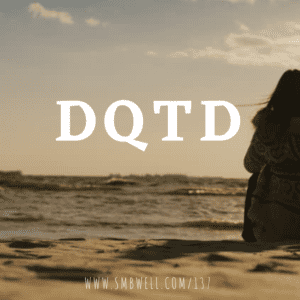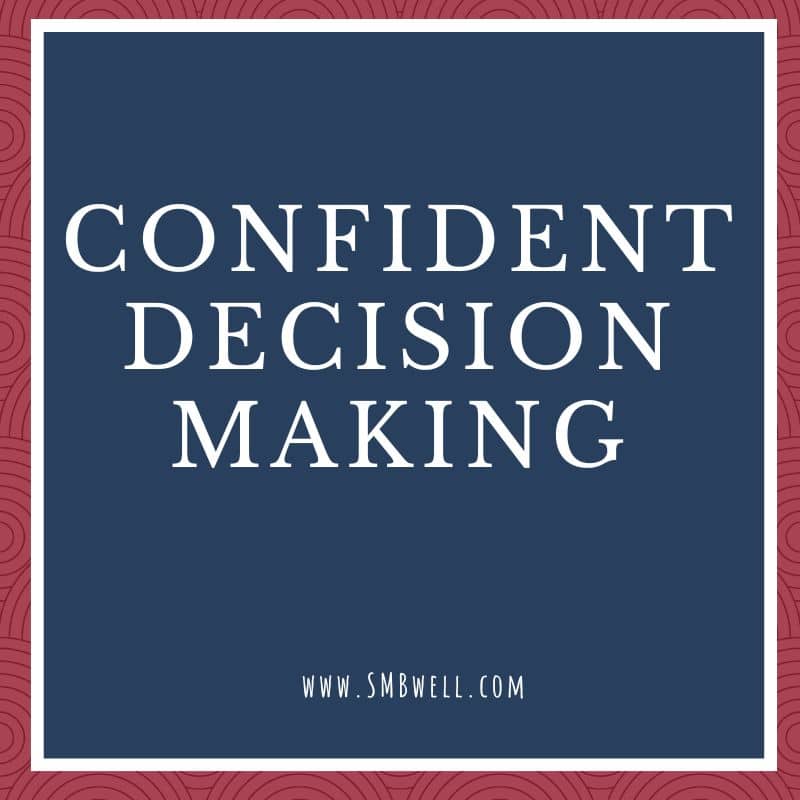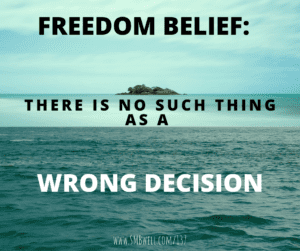Podcast: Play in new window | Download
Subscribe: Apple Podcasts | Spotify | Amazon Music | RSS | More
Decision Making
Decision making is a skill, that when practiced, improves our life.
Shortening the time it takes to make a decision moves us towards our goals faster and towards living that life we want to be living. When we spend a lot of time in indecision, we delay life. We put off doing things. We stay too long in a situation. We spend time in feeling the feelings of stress, guilt, regret, and overwhelm. Learning how to reduce or eliminate drama around decisions helps to greatly reduce the overwhelm and stress that we feel in life. Here are three main factors to consider when strengthening the decision-making muscle.
1. Growth Mindset
Adopting a growth mindset is what I believe to be the most important piece of the drama-free decision-making. What does a growth mindset around decisions look like? Believing there is no right or wrong decision to be made. Being open to think that there’s a decision and there’s a lesson. Most of us have a fixed mindset regarding decisions and it slows us down. We think there’s a right or a wrong decision. That there’s a right way of doing something and a wrong way. As if there’s some judge or jury on your life who comes back and says, yep, you’re right. That was the right decision. Nope.
Do yourself a huge favor and challenge that belief. Start to catch yourself when you’re thinking that there’s a right or wrong, good or bad decision. Talk back to that voice in your head. When I think that there is a right decision and I have to make the right decision, I feel many unhelpful feelings. Overwhelm, doubt, confusion, uncertainty. None of those emotions lead me to take proactive actions in my life. When I feel overwhelm or confusion I waste my precious life.
I avoid feeling those feelings when I adopt a growth mindset and think there is no wrong decision. I practice thinking and looking at all decisions as lessons. There are decisions and there are lessons. When I reflect on past decisions that maybe didn’t go as I expected, I practice thinking that that was the right decision for me at that time. That I learned from that decision and it happened exactly as it was meant to. I don’t waste my precious energy debating with the past and thinking it should’ve happened differently as the past always wins. It happened. I can’t change it.
Examples of Decision Making with a Growth Mindset
Here’s a personal, semi-trivial example: I live outside of Washington DC. The other day my son and I wanted to go to a certain restaurant in the city for lunch. There are many different ways to get to the place we wanted to go. Many different options. I chose one, we went and that was that.
What many of us do in life is spend a lot of time debating the different routes, overthinking what will happen if we go one way or the other, thinking there’s a right way and a wrong way. If someone left my house at the exact same time and went another way, it’s possible they could’ve arrived at the restaurant sooner. Does that mean I made the wrong decision? I argue no.
Maybe the trip took a bit longer so I got to talk more to my son about something that wouldn’t have come up in conversation if the trip were shorter. Maybe we got to see some pretty sites or buildings we wouldn’t have seen if we went the other way. Maybe we would’ve been in an accident if we went the other way. The first part of this step is to move out of black or white thinking around decisions and adopt more of a grey landscape when it comes to decision making. A more casual “I’ll try this” when in the moment and, afterward, upon reflection, choosing to think my growth mindset power through on decision making:
I made the right decision for me at that time.
Another far less trivial example is of choosing to end my first marriage. If I chose to view my decision to marry my ex as right or wrong I may have spent a lot of time judging myself and my decisions when I was 20 years old. I was no longer that 20 year old and could not go back and decide differently so adopting a growth mindset was something that was greatly encouraged of me by counselors and coaches.
For me to dig into whether I made the right or wrong decision back then would’ve wasted my time in making my decision in the present day and would have led me into a feeling state of guilt and possibly shame. A “I should’ve done differently” is a significant waste of life energy. What can I do about it now? Accepting the state of my marriage at that point and choosing to think I made the right decision for myself at that time was much healthier and didn’t paralyze the process.
2. Constraint
Part of being an adult is building our constraint muscle. For decisions, let’s look at our constraints in terms of time and information. First, time. Set a decision deadline. I like to ask myself how long do I want to take to make this decision. How long do I want to spend thinking about it? The more we constrain ourselves in time for how long we have to make a decision, the less drama we bring into our lives and the more we get into the business of living our lives.
Remember my example of going to lunch with my son. I had a natural time constraint in that we were hungry and it was lunchtime. How much time did I want to spend choosing a route? Very little to none. Decide and do. Try it!
Remember our brains are supercomputers. When we are in the process of making a decision it’s like we have a window open in the background of our brain desktop drawing energy from the other things going on in our lives. Choosing a decision deadline helps limit the drama we create in our lives. Minimizing how long we have that window open is helpful.
Decision Making Constraint
The second area of constraint that I want you to think about is information gathering or input. When you have a decision, choose to gather a reasonable amount of data and then make your decision. Taking the route example top of mind, I gathered very little data as it was a small decision. I knew there were no big traffic-generating events in DC and I knew I was driving (versus my son). If my son had been driving, since he’s a new driver, that would have factored into the route we chose. As it was, I chose to gather minimal input and decided.
Live and learn. Especially with decision-making. Decide and do. I did that to write this post. Do you use a cleaning service? There are 100s out there. Choose one. If it doesn’t work, choose another (growth mindset). Do you order groceries online? Instacart? Safeway? Hello Fresh? Amazon? Choose one and go. Everything is figureoutable. If there were only one way of doing things, we’d be little robots. Instacart works for me. It may not work for you.
Where do you waste time in indecision? Where can adopting a growth mindset, that there’s no right answer, help you save time, mental and emotional energy, and drama? Do you waste time asking for lots of opinions, doubting your own guidance? Set a constraint on your information gathering. Begin limiting how many people you speak to about your decision (or how many google searches you do). How often do you tell yourself I don’t know or I don’t care? This is another whole post as we women have been trained as girls to not have opinions, to not speak up, or rock the boat. Guess what: We’re women now. Have an opinion! Care! When you hear yourself say: “I don’t know” ask yourself “if I did know, what would I think?” Decide, learn and move on. Indecision costs us.
3. Commit
Step three is commit. Commit to your decision. Go all in. Be your decision-making cheerleader. Don’t waste time questioning yourself or worrying if you made the right decision. Remember, there is no right decision. There’s a decision and there’s what we learn from that decision. It’s our choice as to whether we label it good or bad. Our opinion. Commit to your decision and go. Feeling uncertainty about your decision is not a sign that you made the wrong decision. Rather, it’s a sign you’re human. There will always be uncertainty when we are trying new things; when we are pushing ourselves to new levels. Feel the fear and do it anyway. Commit to your decision.
As a coach, I see a lot of people move through the first two steps of decision-making and get into trouble by skipping this step. What do I mean by that? Take weight loss. I have many clients that make a decision on how to lose weight in a short period of time with minimal external input or research. The results aren’t realized when they don’t commit to their decision. My weight loss process has four daily steps. These steps when done consistently lead to permanent weight loss. If they do the four steps they will lose weight.
The ones who commit to their decision to work with me, commit to the four steps, and commit to being a cheerleader of their decision, experience success. Every single time. 100%. Myself included. The ones who don’t commit don’t experience the results they want because they haven’t gone all-in. They end up spending more time doubting their decision than committing and believing in their decision.
DQD Don’t Question the Decision
If and when you make a decision, commit to your decision. Tell yourself this is the right decision. Don’t waste one of your precious seconds asking yourself did I make the right decision. BONG – evidence you’re skipping step one and aren’t in a growth mindset. Decide ahead of time that your decision is the perfect one for you to learn what you need to learn and Commit. Go all in. Author Holly Whitaker has a tattoo with NQTD which stands for “never question the decision” Meaning don’t waste time second-guessing yourself. The decision is done. You’ve made it. Now do it. Keep your eye on the future.

Do the decision and choose to learn from it. I commit to this blog and can learn from it. I commit to a route with my son and learn from it (we went home a different way, btw). Commit to a morning routine for one week and learn from it. I commit to my divorce and learn from it. I spend none of my precious brain energy thinking “did I make the wrong decision?” There is no wrong decision. Questioning myself and my past decisions is 100% unhelpful 100% of the time.
As Byron Katie says, don’t waste time arguing with the past. It happened. You can’t go back and change it. You can learn from it and move on. There are no wrong decisions. There are lessons and that is life. We are here to learn. I have never made a wrong decision. Everything that happened in my life, all my decisions, led me to become the woman I am, living the life I’m living. I reflect often with kindness and compassion on my younger self while keeping a firm focus on my future self and reminding myself that the faster I make decisions and learn from them, the more life I squeeze from this one precious life I’m living.
Moving Forward:
And so dear warriors, let me know: which decisions are you working on? Send me a message on Instagram or email to let me know. This is where coaches are magical. I am not in your life. I have the unique ability to be impartial and nudging you towards action. If you don’t have a life coach yet, I’d love to be yours. Click here and let me support you. I work one-on-one with clients and run the Love Your Life School, an exclusive online self development school for women over 40.
Life is short. We don’t know what the future holds. We do know that stress and overwhelm aren’t good for our systems or for moving us into proactive action. I wish you an awesome, decision-filled week.









Trackbacks/Pingbacks